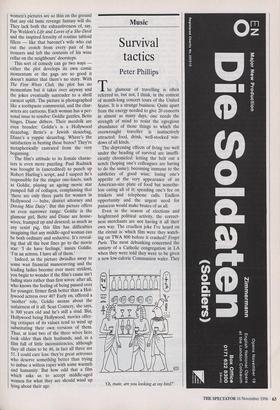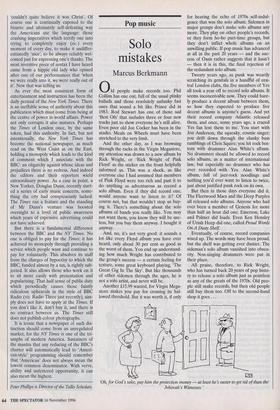Music
Survival tactics
Peter Phillips
The glamour of travelling is often referred to, but not, I think, in the context of month-long concert tours of the United States. It is a strange business. Quite apart from the energy needed to give 20 concerts in almost as many days, one needs the strength of mind to resist the egregious abundance of those things to which the overwrought traveller is instinctively attracted: food, drink, well-stocked win- dows of all kinds.
The depressing effects of living too well under the heading of survival are insuffi- ciently chronicled: letting the belt out a notch (hoping one's colleagues are having to do the same); becoming immune to the subtleties of good wine; losing one's appetite at the very appearance of an American-size plate of food but nonethe- less eating all of it; spending one's fee on trinkets and telephone calls. Endless opportunity and the urgent need for panaceas would make brutes of us all.
Even in the season of elections and heightened political activity, the correct- ness merchants are not having it all their own way. The cruellest joke I've heard on the circuit is: which film were they watch- ing on TWA 800 before it crashed? Forget Paris. The most debunking concerned the anxiety of a Catholic congregation in LA when they were told they were to be given a new low-calorie Communion wafer. They Di, mate, are you looking at my bird?' `couldn't quite believe it was Christ'. Of course one is continually exposed to the bizarre and ultimately self-defeating way the Americans use the language: those crashing imperatives which terrify one into trying to completely enjoy (sic.) every moment of every day, to make it undiffer- entiatedly 'nice', to be always reliably wel- comed just for expressing one's thanks. The most inventive piece of syntax I have heard came from a hippie old lady who opined after one of our performances that 'when we were really into it, we were really out of it'. Now that was telling us.
As ever the most consistent form of entertainment and instruction has been the daily perusal of the New York Times. There is an ineffable sense of authority about this publication which must come from being at the centre of power in world affairs. Power not only corrupts it also matures. Perhaps the Times of London once, by the same token, had this authority. In fact, but not intentionally, the New York Times has become the national newspaper, as much read on the West Coast as on the East, holding a monopoly which leads to the kind of comment which I associate with the BBC: an oligarchy against whose ideas and prejudices there is no redress. And indeed the editors and their reporters wield extraordinary power. As a case in point, a New Yorker, Douglas Dunn, recently start- ed a series of early music concerts, some- thing the city had conspicuously lacked. The Times ran a feature and the standing of Mr Dunn's venture was boosted overnight to a level of public awareness which years of expensive advertising could not have achieved.
But there is a fundamental difference between the BBC and the NY Times. No one is obliged to pay for the Times: it has achieved its monopoly through providing a service which people want and continue to pay for voluntarily. This absolves its staff from the charges of hypocrisy to which the BBC, funded almost by a tax, is rightly sub- jected. It also allows those who work on it to sit more easily with presentation and popularising. That half sense of public duty which periodically causes those faintly ridiculous upheavals in the style of BBC Radio (viz. Radio Three just recently), sim- ply does not have to apply at the Times. If you don't like it, don't buy it, and there is no contract between us. The Times still does not publish colour photographs.
It is ironic that a newspaper of such dis- tinction should come from an unregulated market, for the NY Times is one of the tri- umphs of modern America. Sustainers of the mantra that any reducing of the BBC's charter will automatically lead to 'Ameri- can-style' programming should remember that 'American' does not always mean the lowest common denominator. With verve, ability and unfettered opportunity, it can also mean the highest.
Peter Phillips is Director of the Tallis Scholars.



















































































 Previous page
Previous page